new posts in all blogs
Viewing: Blog Posts Tagged with: First aid, Most Recent at Top [Help]
Results 1 - 7 of 7
How to use this Page
You are viewing the most recent posts tagged with the words: First aid in the JacketFlap blog reader. What is a tag? Think of a tag as a keyword or category label. Tags can both help you find posts on JacketFlap.com as well as provide an easy way for you to "remember" and classify posts for later recall. Try adding a tag yourself by clicking "Add a tag" below a post's header. Scroll down through the list of Recent Posts in the left column and click on a post title that sounds interesting. You can view all posts from a specific blog by clicking the Blog name in the right column, or you can click a 'More Posts from this Blog' link in any individual post.

By:
Claudette Young,
on 7/11/2012
Blog:
Claudsy's Blog
(
Login to Add to MyJacketFlap)
JacketFlap tags:
Life,
weather,
Writing and Poetry,
Heat index,
Heat wave,
First aid,
Air conditioning,
Dehydration,
Work-related,
Heat illness,
Western Washington,
Add a tag
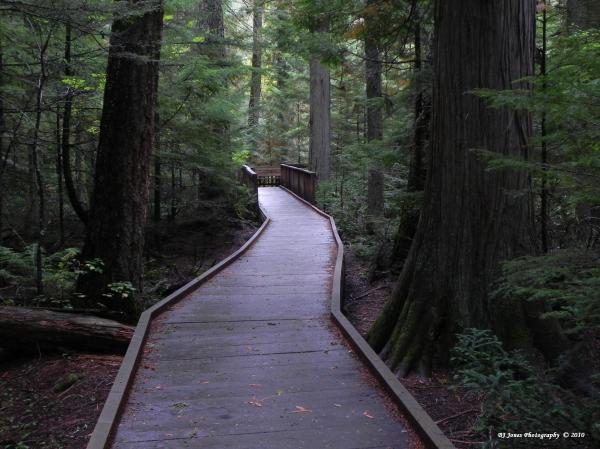
Trail of the Cedars, Glacier National Park
By now nearly everyone across the country has been to a stage of sweltering in the heat. It doesn’t matter where you live, except maybe in Western Washington, you’ve worked at staying cool.
When I talk about working in the heat, I’m not talking necessarily about laboring outside in it. Those who seldom leave the house, except for errands, are also at risk from heat. It depends on how cool the building is and how much air flow there is.
The heat affects all of us in similar ways. We get cranky when we get too hot. Tempers shorten as temperatures rise.
Attention wanders. Staying focused is possible but much more tiring at 95° than when at 70°. Dehydration begins to make its move and assaults the body, which has specific requirements. Thirst drives a person to intake more fluids, which results in more trips to the bathroom, which also pulls the attention away from your keyboard.
Sleep doesn’t come easily in the heat. There is no such thing as a comfortable position on the bed, couch, floor, hammock, or whatever reclined surface you can find. Sleeping on the porch isn’t an option either. It’s rarely much cooler out there than inside the house and other considerations remain; mosquitos, the odd stray dog, or worse, cat on the prowl.
Solutions? Oh, there are a few, but not many aside from air conditioning.
Let’s face it. We’ve become a society of wimps. Our pioneer ancestors—yes, even those in the 1940’s—didn’t need air conditioning. They worked, cooked, played outside with the kids, went to ballgames, etc. and all of it in the heat.
Here we are, subject to heat, many without blessed air conditioning. Take a crack at what the oldsters did. Put a big bowl of ice in front of the fan and let simple evaporation help cool you off.
Rearrange your work schedule, if you can, to move the most active part of your day to the cooler pre-dawn and early morning hours. Shift your priorities to help yourself. Decide how many cold meals you can prepare at one time. Cold soups, meats, fruits, etc. can help you think you’re cooler, even if you aren’t.
For those who snicker because they have air conditioning, remember this. You still have to go outside in it to get from point A to point B. That’s at least one chance to get your hand burned on a door handle, to burn the backs of your legs when derriere meets car seat or bench, to inhale vaporous flame upon ordering that snow cone from the corner vendor, who’s stood out in that heat to provide you with cold, soon-to-be-liquid refreshment.
But above all, realize that you’re not alone. Heat drains your energy. Even when you’re working at home or at the office, if you don’t have air conditioning, take it easy on yourself. A cool washcloth on the back of the neck does help. Keeping your feet cool drains more heat from the body than you might think, and make sure that keep sw

By:
Claudette Young,
on 7/11/2012
Blog:
Claudsy's Blog
(
Login to Add to MyJacketFlap)
JacketFlap tags:
Dehydration,
Work-related,
Heat illness,
Western Washington,
Life,
weather,
Writing and Poetry,
Heat index,
Heat wave,
First aid,
Air conditioning,
Add a tag

Trail of the Cedars, Glacier National Park
By now nearly everyone across the country has been to a stage of sweltering in the heat. It doesn’t matter where you live, except maybe in Western Washington, you’ve worked at staying cool.
When I talk about working in the heat, I’m not talking necessarily about laboring outside in it. Those who seldom leave the house, except for errands, are also at risk from heat. It depends on how cool the building is and how much air flow there is.
The heat affects all of us in similar ways. We get cranky when we get too hot. Tempers shorten as temperatures rise.
Attention wanders. Staying focused is possible but much more tiring at 95° than when at 70°. Dehydration begins to make its move and assaults the body, which has specific requirements. Thirst drives a person to intake more fluids, which results in more trips to the bathroom, which also pulls the attention away from your keyboard.
Sleep doesn’t come easily in the heat. There is no such thing as a comfortable position on the bed, couch, floor, hammock, or whatever reclined surface you can find. Sleeping on the porch isn’t an option either. It’s rarely much cooler out there than inside the house and other considerations remain; mosquitos, the odd stray dog, or worse, cat on the prowl.
Solutions? Oh, there are a few, but not many aside from air conditioning.
Let’s face it. We’ve become a society of wimps. Our pioneer ancestors—yes, even those in the 1940’s—didn’t need air conditioning. They worked, cooked, played outside with the kids, went to ballgames, etc. and all of it in the heat.
Here we are, subject to heat, many without blessed air conditioning. Take a crack at what the oldsters did. Put a big bowl of ice in front of the fan and let simple evaporation help cool you off.
Rearrange your work schedule, if you can, to move the most active part of your day to the cooler pre-dawn and early morning hours. Shift your priorities to help yourself. Decide how many cold meals you can prepare at one time. Cold soups, meats, fruits, etc. can help you think you’re cooler, even if you aren’t.
For those who snicker because they have air conditioning, remember this. You still have to go outside in it to get from point A to point B. That’s at least one chance to get your hand burned on a door handle, to burn the backs of your legs when derriere meets car seat or bench, to inhale vaporous flame upon ordering that snow cone from the corner vendor, who’s stood out in that heat to provide you with cold, soon-to-be-liquid refreshment.
But above all, realize that you’re not alone. Heat drains your energy. Even when you’re working at home or at the office, if you don’t have air conditioning, take it easy on yourself. A cool washcloth on the back of the neck does help. Keeping your feet cool drains more heat from the body than you might think, and make sure that keep sw

By:
Paula Becker,
on 1/24/2012
Blog:
Whateverings
(
Login to Add to MyJacketFlap)
JacketFlap tags:
Childrens Ministry magazine,
welcome wednesday,
heart matters,
Links,
group publishing,
january 2012,
cartoon,
comic,
General Illustration,
Samples,
paula j. becker,
paula becker,
first aid,
Add a tag
Some recent editorial work for a magazine. These are a nice diversion from children’s illustration.



By:
Bill Kirk,
on 8/12/2011
Blog:
billkirkwrites
(
Login to Add to MyJacketFlap)
JacketFlap tags:
writing,
hiking,
wilderness,
camping,
Scouting,
backpacking,
billkirkwrites,
Bill Kirk,
First Aid,
Eagle Scouts,
GORP,
Wilderness First Aid,
Add a tag

DAY TWO: Sunday, July 31
Got up early this morning eager to hit the trail. Because we had the benefit of starting our trek from the comfort of Todd Thompson's cabin yesterday morning, this is our first full day from start to finish on the trail.
As a practical exercise, it is our first experience stepping through what we expect to be a morning routine: breakfast, tents down, all gear repacked, morning constitutional, water supplies replenished, energy supplies for the day easily accessible....
As with any first time experience, there are lots of "dos" and "re-dos". Is my pack as tight as it can be? Is my water topped off and did I distribute it evenly in my pack? Is the bear cannister positioned where it will be most comfortable on my back? Where did I put my walking stick? Sun screen and mosquito repellent on? Leave no trace.
We leave our accommodations near Gilmore Lake by 9:30 as the sun is already beginning to warm the air and the mosquitos are on the hunt. We have seen almost no wildlife on the trail except a rare sighting of an occasional bird or marmot. So, how can there be so many mosquitos with so little to feed on? With the heavy and late snow falls this year and the delayed spring, the mosquitos are birthing late and are in survival mode. That might explain the constant swarms around us---even hundreds perched on our packs as we hike, waiting for an injection/extraction opportunity.
The only natural defenses seem to be a stiff breeze or the cold air surrounding us as we hike across snow. And did I mention real estate? Apparently, mosquitos didn't get the memo re: location, location, location. Based on the number of bites (I stopped counting at 200) in places where there shouldn't be bites, let's just say mosquitos are not picky eaters. Granted it is anecdotal evidence from a limited sample of one using a small spade in the forest. But I can attest to a validated research finding suggesting an untapped market niche for TP infused with "Essence of Off"!
Leaving Gilmore Lake, we hit a steady uphill with several large snow fields to cross. If the slope faces north, you can count on snow. Navigating across even narrow stretches of snow is a challenge with a pack on your back. But after losing the trail too easily east of Aloha Lake yesterday, we are tuning in much more closely to where the trail should continue on the other side of each patch of snow. Although we only lost the trail briefly on the approach to Dick's Pass (elevation 9,380 feet) this morning, it has taken us over three hours to hike up through the pass and back down to Dick's Lake (elevation 8,360 feet).

The relatively easy hike on the "down" slope leaving Dick's Pass has made the decision easy to pass Dick's Lake by, opting instead to pump water at the north end of Fontinillis Lake, about 1.5 miles further on. We are celebrating that decision on two fronts: the mosquitos have totally disappeared and Fontinillis Lake is strikingly picturesque, beautifully set amidst lots of large boulders all along the shoreline.
After replenishing our water and recharging with GORP, energy bars and gels, Middle Velma Lake is our next landmark, which we should reach by
By Bill Kirk
Bill Kirk's Website
(Published in Scouting e-zine Cracker Barrel, 2008)
You'd think it would be easy,
To tell about the day's
Events and how they happened
In ordinary ways.
But this day wasn't normal,
Though it was kind of cool.
I learned to care for victims
At Boy Scout First Aid school.
At first I was a victim.
I had a "broken arm"
And "bruises" and a "headache"
As if I'd come to harm.
An "accident" had happened
On my "mountain bike."
But soon I was "discovered"
By "hikers" on a hike.
They checked out all my "bruises,"
And bandaged all my "scrapes."
In no time they had splinted
My arm with sticks and tapes.
Soon after I was "stable"
I had another role-
To help a rock slide victim
Impaled upon a pole.
Of course, he was "unconscious."
His "skull" had hit a "rock."
Because we had just "minutes,"
We worked against the clock.
At first we rolled him over
And "stabilized" his "spine."
We did a lift and carry;
In no time he was fine.
Several hours later,
The day was finally done.
Although the lessons were intense,
We'd learned while having fun.
When I got home, exhausted,
My wife said, "How's your day?"
"You won't believe..." then I just couldn't
Bring myself to say.

By:
Bill Kirk,
on 7/17/2009
Blog:
billkirkwrites
(
Login to Add to MyJacketFlap)
JacketFlap tags:
blogging,
humor,
poems,
rhymes,
Cracker Barrel,
Scouting,
Boy Scouts,
billkirkwrites,
Bill Kirk,
First Aid,
Add a tag
Sometimes you get a surprise. On a lark I sent a poem (this one is a rhyme) to Boy Life magazine. Although it didn't quite fit the needs for the magazine, the editor offered that they were hoping to put it in a Scouting blog in what is known as the Cracker Barrel.
Let's face it, he had me over a barrel so how could I refuse. Knowing the Cracker Barrel is used as a source of useful information, helpful hints for Scouting activities and generally to give Scouts and Scouters a chuckle, I am a fan. So, I was glad my rhyme about taking a weekend Wilderness First Aid course would in some way contribute to the greater good. Besides another credit is one more cobblestone on the road to writer heaven.
Here's the URL that will take you to the Scouting blog if you wish to check it out. On the Trail to Eagle, it's all good.
http://blog.scoutingmagazine.org/2009/07/what-a-weekend-rhyming-edition.html#more .
Here's another nice find. It's the 1957 edition of First Aid, published by The American National Red Cross.
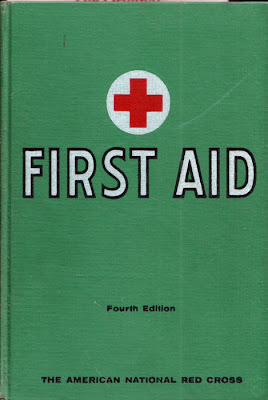
This happens to be the 23rd printing from 1965, which was used by my dad in the mid '70s while taking a first-aid course in college. Let's just hope that they aren't still certifying people with 20 year old text books. Either way this booger has got some great photos and illustrations. First of all, it would appear that in the 1950s only men were allowed to carry men and women to carry women. Something I wasn't aware of.
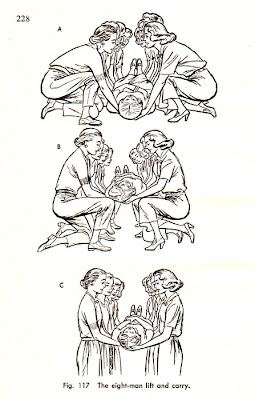
"Now what?"
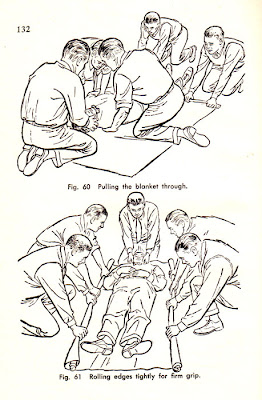
"Dan, you're going to have to get up. We're trying to roll up this blanket."
And how many times has this happened to you? Reminds me of my childhood. (Notice the ashtray on the coffee table. Completely unnecessary.)
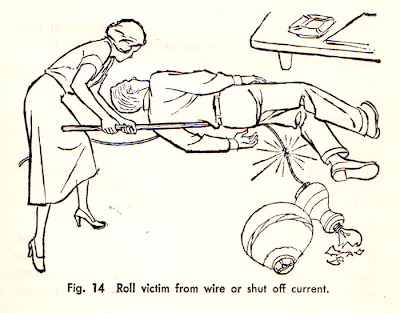
"Billy! Your father fell asleep on the frayed cord again. Get the broom!"
And I like this calm and collected accountant in the bow tie who seems to have poked himself in the eye with his pencil.
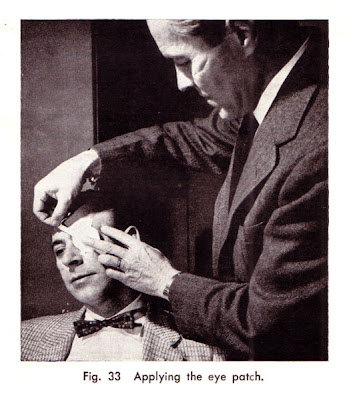
"Thanks again for helping me, Carl. It really means a lot."
"Oh, don't mention it, Sam. You covered for me that time I cut my cheek with a protractor."
And finally, some nice water rescue techniques.

"Pete, let go of me! I'm serious!"














Excellent advice, and a very good post, Claudsy.
Hi Claudette: I liked your reference to our pioneer ancestors who had better sticking power than we do. I agree with you completely – - we are a society of wimps, having become babied and pampered with great conveniences. When we had our recent electricity power failure for 2 whole days, I could not believe how unbearable it was to not have access to air conditioning. My family in other states thought we were nuts for sticking it out, but we did. Our family of 4 survived, made good use of cold running water in our dark bathroom, and thanked God profusely once the electricity came back on.
Thanks, Misky. Glad you liked it.
Yep, we’ve become weaklings. I look around sometimes and feel for all of those elsewhere in the world who will never experience air conditioning, or electricity, for that matter, and wonder it our way is worth the price. Worth thinking about.